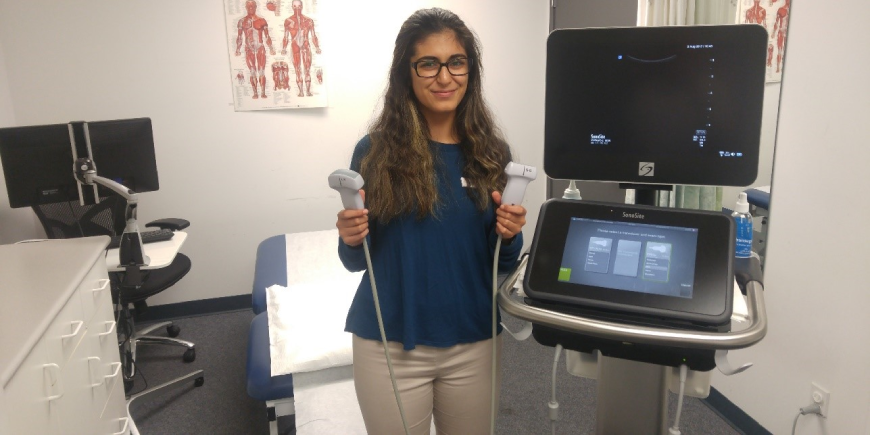
A series of numbers unlock the door to the room where I will be spending the first 4 hours of my day: the iSITES (Integrated Specialist Interventions Targeted by Enhanced Sonograms) room. Quickly I step towards the chronicler station and start up the two necessities for the morning: Accuro EMR and Slack messaging system. As the computer whirrs to life and the programs slowly load I quickly look over the room and see if anything is amiss. Clean bed, spotless counters, shelves stocked with needles, syringes, ropivacaine, lidocaine, dexamethasone, dextrose, sanitization equipment, and surgical gloves. I print the schedule and look for the doctor, the day is ready to begin. Ultrasound machine humming, fan blowing, and the keyboard clicking underneath my fingers are all I hear as I prepare for the day.
Reflecting Back
Soon I will be starting my 4th year at SFU. Nearing completion of my degree, I am thinking of the future. Like many students before me, and many students after me, I came to SFU with my mind set. I have had my path mapped out since I started high school. A step by step calendar that I had written in thick black sharpie on bright orange poster board paper, now stored underneath my bed in a blanket of dust. I only had one plan. This list was a reflection of the tunnel vision I once had.
After 2 years at university the vision that I had for myself started to waver, but by no means in a bad way. I no longer had tunnel vision. I was no longer set on getting to one goal, as university opened my eyes to the hundreds of jobs and future options that were available. In my second semester of my second year I signed up for co-operative education through the Work Integrated Learning program. After one semester of cover letter, resume, and interview workshops, and another of rigorous job applications and interviews, I was placed in the job of my dreams.
In January 2017, I began an eight month position at CHANGEpain Clinic (CpC); a chronic pain clinic located in Vancouver. The eight months spent as a Clinical Chronicler and Research Assistant at CpC completely exceeded my expectations and took me on an incredible journey of self growth.
What is it all about?
I have gained an exceptional array of knowledge during my time at CpC, one of the first things I came to understand was: what is chronic pain? Chronic pain is pain felt by the body, even after an injury has healed. In many cases the pain is now psychological and “in the brain” without leaving any visible signs on the body. There are no broken bones and no open wounds. In some cases the patient may physically look completely okay, while really being in debilitating pain which hinders their ability to work, take care of themselves, or enjoy their lives. This can lead to decreased productivity, loss of employment, and depression. Scans and MRI’s may not show spinal stenosis, disc herniation, or abnormalities. There is no reason for the pain to be present, except for the fact that it is.
It’s all about Empowerment!
At CHANGEpain Clinic our goal isn’t to simply reduce and eliminate a person’s pain. Realistically in many cases that is not possible. We strive to empower people to change their pain through numerous MSP covered group medical visits run by medial professionals at our clinic. We believe that by pairing education with medical intervention the outcomes are better, and the patient develops life skills to better cope with and understand their condition. In this era, where almost all of the knowledge on earth is easily (although not always accurately) accessed through a simple Google search, we want our patients to know what is happening to their bodies and to provide them with the most accurate, and reliable information on what they can do to better themselves.
To empower patients to overcome their pain we want to take their reliance on their physician and put it back in their hands. We want to teach them how they can take the steps to better their own health.
The CHANGEpain Layered Care Approach
When you get a paper cut on your finger, the first step of care is not to amputate the digit to save yourself from life threatening infections, but to simply clean the wound and apply a sterile bandage. Jumping to that last invasive step actually has many more complications and is not necessarily the best choice. In the same way, when dealing with a patient it is important to start with the least invasive therapy options. These are not only less costly, but have less adverse side effects and are more accessible to patients. At CHANGEpain we put emphasis on patient education through group medical visits and CHANGEpain Together programs. Depending on the need of the patient, they will be recommended to certain programs that they would benefit from the most.
The first layer is education and lifestyle, this is the base of the layered care approach pyramid. Medications, surgeries, and medical interventions are more effective when paired with lifestyle changes. Increased knowledge about their condition can help patients make better dietary choices, help with their mood, and learn how to better pace themselves in their day to day lives. Condition specific group medical visits (such as CRPS, Neuropathic Pain, Whiplash, Low Back Pain, Headache, and Fibromyalgia) can be paired with more general group medical visits such as Pain Science, Sleeping, and Foundations of Movement. With the wide variety of MSP covered educational programs all patients, no matter their prognosis, are able to find a program that is beneficial for them. Now, it is up to them to decide if they wish to take part.
At CHANGEpain Clinic we offer programs that fall under 5 different pillars of self-management. All these modulators are essential and work together in creating a sense of self-balance and help patients improve their lifestyle. We have made it one of our goals to provide MSP covered group medical visits under all of the pillars so that patients who are under financial burden are able to take part in increasing their education in all of the 5 categories. Apart from the MSP physician led group medical visits, at CpC we offer many self-management classes under the CHANGEpain Together program run by experienced instructors. These classes are private pay but those with extended health care benefits may be able to obtain partial or full coverage. The highlights of these groups include: smaller class sizes, select course offerings online, and participants do not necessarily have to be CpC patients to take part. These classes are open to anyone and there are no waitlists. CHANGEpain Together programs include a wide variety of classes including Chair Yoga for Chronic Pain, Nutrition to CHANGEpain, Relaxing to CHANGEpain: Thoughts and Emotions, and a wide variety of psychology classes spanning topics such as relationships, anxiety, and depression.
When first starting at CpC I knew I already had a passion for health care, and although I didn’t know much about chronic pain I knew that it was something that effects countless people in the world. From working with the doctors and the other experienced chroniclers and staff I have learnt much about the approach to take when talking to certain patients. To not only be sympathetic, but also empathetic when helping others, and the importance of patience and kindness when dealing with delicate scenarios.
Although it is hard to say what the future holds, I can confidently say that with the skills I have gained from my Co-op position at CpC, I feel that I can handle any situation that I may be faced with in my future.
Beyond the Blog
-
To learn about opportunities like Yasmin's, visit the Health Sciences Co-op homepage.














